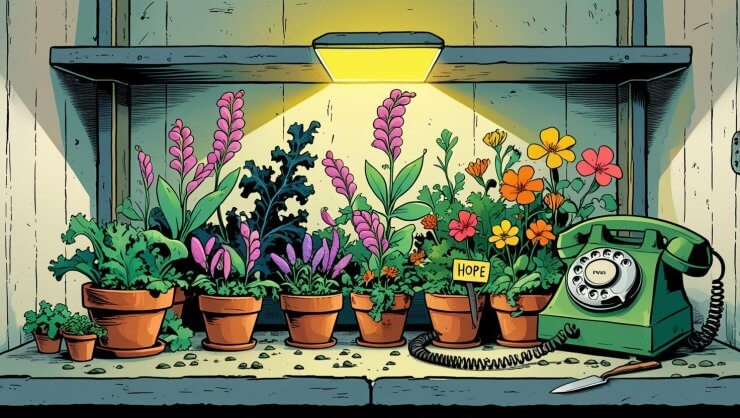Read by Michael Flamel

You might not think of garden-tending as one of the first waking thoughts for a prisoner. But Adam isn’t your average prisoner. From 6:30 a.m., when the doors crack open until 10:10 p.m. lockdown, he may be found Iovingly tinkering with the makeshift garden that he and another inmate have inventively fashioned on top of a dusty 1980s era bookshelf.
There, in our housing unit, above older paperback tomes from authors like Sidney Sheldon, Tom Clancy, and Nora Roberts, our small jailhouse garden rests peacefully. As men normally do, we dove right into the project with a hodgepodge of supplies and zero instructions. Admittedly, it was a learning curve. We wondered why the flower seedlings kept weeping downward and dying off. WelI, we had about 100 sprouts in an 8-inch pot.
Adam’s mom chuckled heartily over the phone when he called her for gardening tips—from prison. “That was the first time in a long stretch that I remember her laughing so hard,” Adam said, a bright smile plastered on his face. “It feels really good to hear her genuine happiness again.” His mom, a natural green thumb, enthusiastically takes Adam’s daily phone calls now. They are rekindling their relationship because they’ve found a mutual healthy topic.
Our sweet peas took off nicely to the dirt at first. Then the little stinkers promptly started grabbing each other in wicked tangles. Adam called Mom and we listened in anticipation with the antique telephone-booth style receiver pressed between our ears. Her first question, “How many plants do you have per pot?” “About a dozen in a 6-inch pot,” Adam said. She cackled, “Oh, no, honey you need more space per plant, otherwise the sweet peas will choke one another.” So, he busted out some Dixie cups and transplanted them to root as singles.
We started the adventure with meager supplies. Our inventory: about 1-square-foot worth of dirt, a half-used bag of vermiculite, flower, bean, kale, sweet pea, lettuce, and a variety of other unlabeled mystery seeds, two petrified Nutra pellets, one spray bottle, a 1-foot fluorescent light, a broken metal support rack, and a few small plastic pots.
Thanks chiefly to Adam’s persistent maintenance and his mom’s on-call “phone-a-gardener advice,” our shelf-top garden thrives. There are bean stalks, flowers, kale, sweet peas, cimarron, lettuce, and some unknown sprouts. They smell like freedom.
The best thing about the garden is its intrinsic therapeutic value. Even the hardest of criminals seem to relax when they gaze upon the small oasis which stands proudly amid the concrete walls and steel tables.
“Hey buddy, you’ve gotta check out what I did to the garden today!” Adam exclaims as I return to our unit from work (GED tutor). A transplant here, a pot rearranged there, or perhaps a new watering mixture.
These are all reasons why even beginning gardeners should seek new projects amid the patch, garden, grove, or even the kitchen window. Plant a new breath of life.
The garden brings people together and helps bridge the gap between prisoner and guards. “Hey guys, how are those beanstalks coming along?” a decent guard asked last week. Some inmates plot devious ways to smuggle drugs or contraband into the prison system while we’re trying to figure out how to glean a bottle of Miracle Gro®. We have a serious situation. The kale looks rather spindly.
After years in prison, witnessing my friend Adam’s transformation from depression to happiness has been a true aha moment. Gardens lift spirits unwaveringly. It’s a pleasure to see that the young sprouts grow just as his relationship with his mom cultivates a root of strength renewed.
Let us all, young and old alike, be encouraged to tackle our ideas for tilling earth. Revisit the lost dreams you’ve long held in your heart but have not yet harvested within the soil. Get inspired to tackle that procrastinated venture with vigor.
And lastly, please remember if any man asks you for gardening tips, he is truly vulnerable and reaching out in faith that you won’t laugh at him. But you should go ahead and laugh anyhow because on their last phone conversation, Adam’s mom said, “Anybody who can’t laugh at themselves definitely needs more gardening in their life.” No matter who or where you are, that advice is pure gold. ❖
About the Author: Ben Wilkins is a writer and poet. His work has been published with the National Writers Association, Columbia University, FreebirdPublishers.com and elsewhere. Though currently imprisoned in Alaska, he aims to inspire readers. Ben also writes self-help books for prisoners. He is hungry for opportunity and ice cream.


 Previous
Previous


I Love this story. Hope springs eternal. I remember a time in my life when a garden saved me.❣️